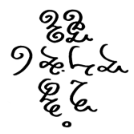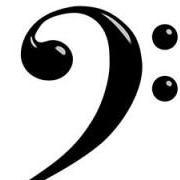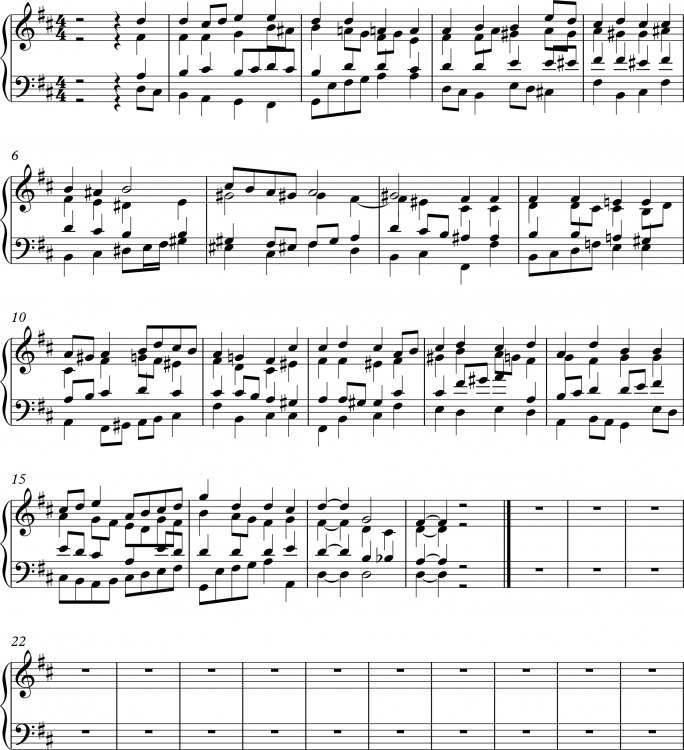Search the Community
Showing results for tags 'bach'.
-
One minutious revamp, two of Bach's favorite instruments, three dazzling voices - this piece has it all for me. The title is pretty much self-explainatory. Otherwise, please consider reading my YouTube video description here: Enjoy!
-
I wrote this a while ago and listened to it again today and remembered how nice it was, its light music. The work has a fluid form, it's more like a stream or flow of conciousness on a few motivic ideas, so it's both changing and staying the same all the time. The harmonies are good old triads expanded via non-functional (mostly) non-clashing diatonic extensions. I remember I made up some rules for the counterpoint and that it was relatively straight-forward to compose but not much else. The "Bach alla Renaissance" is because it is polyphonic, rather traditionally, but the scales are (the modern) church modes. Modes of Accord.mp3
- 2 replies
-
- bach
- renaissance
-
(and 2 more)
Tagged with:
-
Last Thursday was a special date for the history of Western music. 337 years ago, on the 31st of March, a child was born in Eisenach, a town located in Thuringia, modern-day Germany. His name was Johann Sebastian Bach, and he would become one of the greatest composers ever to live, even though most of his fame would be posthumous. Regardless, it has been of the utmost pleasure for me to dedicate one of my humble fugues to the birthday of Master Bach, in order to commemorate his art and work of such unfathomable abundance and heavenly quality as his spirit deserves. Link to the video:
- 3 replies
-
- fugue
- counterpoint
-
(and 1 more)
Tagged with:
-
I think it's time to present myself to this young composer forum, so I would like to show you my very first professional work, my piano sonata in c minor. A piece in for movements that I started composing in summer 2017 and I finished in early 2018. The sonata was originally based in 3 movements, so in 2020, during the pandemic I decided to make a revision of the whole score and to add an extra movement. So, I leave you here the link to the YouTube video where you can hear this piece: PD: If you like my music you could subscribe to my YouTube channel and share my music. Thank you and enjoy!
-
Liebe*r Komponist*innen, ich muss eine harmonische Analyse von Bachs BWV 4 (Christ lag in Todesbanden) - Versus 7 schreiben. Hier ist der Link: https://www.youtube.com/watch?v=ubWCRXefVTw Ich habe Kenntnisse in Harmonielehre und Akkordanalyse mit römischen Ziffern. Wie kann ich eine harmonische Analyse schreiben? Könntet ihr mir bitte einige Tipps geben? Danke im Voraus, Duo
-
chorale How do I write a harmonic analysis of a chorale?
DailyDuo posted a topic in Advice and Techniques
Dear composers, I have to write a harmonic analysis of Bach's BWV 4 (Christ lag in Todesbanden) - Versus 7 for my homework Here is the link: https://www.youtube.com/watch?v=ubWCRXefVTw I have knowledge of harmony and chord analysis with Roman numerals. How can I write a harmonic analysis? Could you please give me some tips? Thanks in advance, Duo -
Somebody knows who is the performer in this aproach on BWV 914? I love his aproach on the adagio, most performers do the passage that starts in the measure 20 (3:34 in the video) of the adagio very slowly and delicate but he or she does it very passionate, that it feels like the red carpet for the fugue.
-
Hello, Recently I created a set of variations for a competition held by the YouTube channel TwoSetViolin. I had to write 11 variations for two violins and piano , each for a different composer or genre. I believe it turned out well, but I should note I only had a week to create it, and each variation had to be at least 20 seconds long. Despite this, it should be a pleasant and thrilling listen. *Headphone warning- loud artificial harmonics in recording Variations: 1. Bach 2. Mozart 3. Beethoven 4. Brahms 5. Debussy 6. Paganini 7. Shostakovich 8. Myself 9. Film 10. Jazz 11. Pop Recording: https://www.dropbox.com/s/2z5f1xcxxbo0idm/TwoSet Variations-EB.mp3?dl=0 Score: https://www.dropbox.com/s/bkckvo0qhbobb60/TwoSet Variations-EB.pdf?dl=0
- 2 replies
-
- violins
- variations
-
(and 2 more)
Tagged with:
-
Variation Project is calling for submission. We are looking to find 5-10 newly composed variations on the canon that was used to compose “Goldberg Variations” by J. S Bach. The canon can be found https://ilyafriedberg.com/variation-project/ Each variation should last between 1 to 6 minutes. You can submit as many variations as you wish, as long as it is done separately. We are launching this exciting project to extend JS Bach’s Goldberg Variation by adding 20-30 newly composed variations. With successful fund raising (please spread the word!) and lots of interests, we hope to bring new freshness to this work. The selections will be made anonymously, purely based on the work. The project assistant will receive the submissions and transfer the anonymous scores for review. The submission to the Variation Project is free. I have decided to fund the project purely from crowdfunding because I wanted to make it possible for composers to submit their works without monetary pressure. So please do spread the word to your fellow supporters of new music and performance. This is the first of hopefully many more projects to discover new composers and their works. In order for this project to come to life, I will need lots of submission AND support thru kickstarter, see details https://www.kickstarter.com/projects/canon/bach-variations-and-more?ref=email The composer of the winning work will receive a professionally produced sound and audio recording of the performance $250 reward The project’s webpage is https://ilyafriedberg.com/variation-project/ Please check the page periodically to be informed of possible new updates. Any information or questions not found can be directed to jconcertseries@gmail.com ELIGIBILITY: Any composer is eligible regardless of age, nationality, sex, color, creed, sexual orientation, marital status, disability or veteran status. TO APPLY: 1. Each entry of one (1) anonymous score must be emailed in pdf format to jconcertseries@gmail.com (subject: “VariationProjectBach”) along with: a. An info sheet (.pdf, .doc, .docx, .odt, or .txt ) with composer’s name, length of work, short bio (no more than one page), and contact information GUIDELINES: 1. Application Deadline: All submissions must be received by 11 :59 pm EST on January 05, 2018. Entries received after this date will not be considered. 2. Regardless of the fact that the project can only be materialized with successful funding, you are welcome to submit your work before December 3, 2017. 3. Composers may submit as many entries as they wish, but separate submission will be required. (only one variation per email) 4. A $250 reward is per variation (ex. If two or more winning variations come from the same composer, the reward will still be given $250/one variation) 5. No name or any personal information should appear anywhere on the submitted score or the subject/body of the email. Any submission with identifying information will be disqualified from the selection and will not be reviewed. 6. Works that require extended piano technique is accepted and encouraged, you may use pre-recorded track to go along with the performance as well. 6. The winning composition will be announced on February 01, 2018. 7. The results will be announced on the project website and winning composers will be contacted individually. 8. Please see the FAQ below for the most commonly asked questions. Any additional questions may only be sent to jconcertseries@gmail.com. Note: Please do NOT send submission materials or any questions to the kickstarter page, generall email address, social media or contact personally, as this will violate the fairness of the selection process. FAQ: Q: Can the variation be longer than 6 minutes? A: No. Every submission must have a duration between 1 to 6 minutes. I am hoping to have the final project (original+ new variations) no longer than 2:30 hours total. Q: Can I submit a work that includes other instruments or electronics? A: No, you cannot include other instruments but you may submit your variation with an pre-recorded audio track. Deadline: 05 Jan 2018 11: 59 pm EST Entry Fee: 0.00 (Your word of mouth will be greatly appreciated for funding of the project!) Currency: U.S. Dollar (USD)
-
- bach
- submisssion
-
(and 4 more)
Tagged with:
-
I spent a good number of hours and wrote this all today. There was a reddit composition challenge for June to write a 2 part invention and I'm a big fan of Bach and developing my faculties in such a way so I gave it a try. Given how much I just winged it and went straight forward with the first subject and so on that I came up with, it pulled together nicely I think.
-
https://soundcloud.com/ian-campbell-89/d-major-chorale-new-version This is the first draft of a little composition assignment I had for a theory 2 class. I am providing audio with piano rendition and have it scored condensed just because it is more practical. I did not put the fermatas in the score but you will be able to tell where they are from listening to the audio with where it elongates at those points. I'm not really trying to emulate Bach but it would be nice to learn more about Bach chorale harmonization, and as many specific critiques and tips as possible would be good. There are a few things like parallel 5ths across a fermata, and parallel octaves in one place, that I already fixed.
-
As a result of the request from @danishali903 to compose some music for solo viola, I have composed this ''Melody for Viola'' (Opus 26) today. See for the post under Community > Repetoire > CALL FOR SOLO VIOLA MUSIC Bach's cello suites have heavily inspired me, as you can probably hear. I have never written for a solo string instrument before, so I hope that it is technically playable. If not, please tell me what and how to improve it. To Danishali: Hopefully, this piece is suitable for your playing in the hospital. I wish you good luck and a lot of fun! Feedback and sharing your opinions would make me very happy! Kind regards, Maarten Bauer
-
Hi, a new video with the main theme from Bach's Goldberg Variations analyzed. Decoding Bach's Harmonic Language https://youtu.be/8TlfgyCB3fk?list=PLt-Oh3MSFwB-mm1oa86m_0R3nh5hQAQs3
-
I have read the works of Fux and Rameau, I am interested in writing music in the style of the baroque and the classical. Before I practice their teachings I have some questions: Apparently Bach, Mozart, Beethoven and Brahms ALL studied along the lines of Fux, and disagreed with much of Rameau's teachings. Again, considering that I am ONLY interested in writing music in the style of the baroque and the classical, should I abandon Rameau and stick only to Fux? I asked this question a month ago, but did not give as much information. Thanks.
-
Hi , here is a pic of a Guitar arrangement of Bach BWV 1009 Cello suite no.3. I have worked out the first 8 bars but not bars 5 and 6 : [G ] [D ] [D ] [G ] [? ] [? ] [D A ] [D ] Can you tell me the chords for bar 5 and 6? cheers!
-
I'm a great fan of Bach's Toccatas for harpsichord (BWV 910 to BWV 917), which have many sections (toccata itself, slow parts, fugues etc.). Do you know any other composer (from a period AFTER baroque) that has toccatas in the same style? I mean, not only the improvisatory/virtuosistic ones? For example, Ravel has a toccata, which is completely different from these ones by Bach. So, I'm looking for any one similar to it (Buxtehude also has some, but he's baroque, and I want from other periods). Thanks
-
I know that there is a line that can be written, as the pedal line, but indicating it is the sostenuto pedal. But I have found other scores that seem to call -or could be played with- the sostenuto pedal, without writting the lines. And I was asking myself if that is allowed. Also, if it is allowed, what is the best way to write it. In example, I have these two scores, that have the notes as indicating different instructions for two instruments -as in violins pentagram in an orchestral score-. Mussorgsky, Bilder einer Ausstellung, Promenade: Bach, Praeludium I, BMV 846 At the first one, in the G key pentagram, we can see two white notes, being played at the same time other black notes are played in the same pentagram. At the second one, at the F key pentagram, we can see again two white notes being played, and other notes played too. But you can see that the first one does not have silences for the second instrument to be quiet until played, and the second one does have silences. Obviously there are not a second instrument, and this indicates something that would be played with the same hand. The musescore program lets me put it or make it invisible. So I am not sure what to do here. If I am writing a score that requires the usage of the sostenuto pedal, may I write the sustained notes as if they were a second instrument, and without silences? Is it obligatory to use the pedal line? I think it looks better using the score as if there were two instruments. But I need to know if this would make my score unintelligible. I think it is more elegant than a lot of ligature lines, and easier to understand than a sostenuto pedal line (as you actually show what notes you want to be sustained). I was thinking in things like this: The second seems to be impossible to play without making the other not sustained not at the same time played, be sustained; or stretching a lot the fingers.
- 9 replies
-
- counterpoint
- mussorgsky
-
(and 4 more)
Tagged with:
-
The latin origin of the word fugue, it implies a sort of battle between two or more parties each one representing an imitative voice, thus the initial theme attempts to flee while the eminent imitation chases the theme in a simultaneous yet harmonious manner. If we are to consider what the fugue means, it seems to be a jousting of warfare which if this or my piece is not a fugue or a variant of the fuga family, then is there a war present or not otherwise something different taking place? Perhaps not a war & if a war, then perhaps the mechanics of warfare are being represented in a set of different warfare protocols.There seems to be a controlled warfare for while the main theme remains dominant first introduced to have total control over the enemy & the auxiliary imitations remaining retardant. Thus the physics of counterpoint can be officially altered thus obliterating retardant imitations & various scenarios where the dominant theme can be counterpointed from the beginning thus an equal juxtaposition initially & instead of retardant imitations, differential respondents or simultaneous differential points of attack to an otherwise predictable aftermath of warfare known as the old fugue of musical & mirroring non-musical supremacy of always the victor & always the defeated. Thus these contrapuntal emotive ideologies one can intellectually & creatively alter the war-zone or not necessarily a war-zone by kings & queens to rather different scenarios, twists & turns, & concepts that them mere fugal family was designed to forbid due to security issues.Thus the reformist, innovatist, visionary, or avant-garde can provide fascinating & even humorous imagery & new concepts with his new fugal logic while the fugal variant can remain & seen for the 1st time in the way it has always been since the monarchy of the baroque era
-
This is a serious discussion on the monumental 2nd & 5th form Bach. I think this to be the greatest performance recording & articulation of these two preludes besides the recording from the episode "The Sixth Finger" from the old Twilight Zone series. I tried with this post to imitate it to the best of my abilities with mere midi tech. I did many things to improve an otherwise dull midi presentation anywhere in the internet regarding these two praeludiums. One-though the first measures of the C Minor one are unplayable by human hands though one would simply shift them an octave higher, they are more true to the best effect an octave lower. Two-there is a new one of a kind left hand section near the ending which satisfies an otherwise mere weak section in the original manuscript. Three, there is a tick-tack accentuation in the 1st 16th of every quadratic structure added to give it extra-ordinary effect. Four-The time meters & note values differ from the original around the mid-section oddly, but more effective, & the endind of the 2nd is more simply effective. While the Praeludium in D Major did not require much alteration on my part except for the partially staccato L.H., Incrementation of velocity but still practically possible to play though very difficult, some minor simplifications. I always call the 2nd, "Prelude Of Monarchs" & the 5th, "Flight Of A God" as alternate titles for my own personal pleasure. I provided the MP3 & the pdf not necessarily for performance, but for the purpose of a minor study into these phenomenal works. If anyone has some additional yet substancial knowledge to add regarding these two jewels, please post your findings. Thank you! Avatar Of Evolution.mp3 Avatar Of Evolution.pdf
-
I found this quite interesting: Chad "Sir Wick" Hughes Aikman b. 1959 Fox b. 1931 Heiden (1910 –2002) Hindemith (1895-1963) Sekles (1872-1934) I.Knorr (1853-1916) Jadassohn (1831-1902) Liszt (1811-1886) Czerny (1791-1857) Beethoven (1770-1827) Neefe (1748-1798) J.A.Hiller (1728-1804) Homilius (1714-1785) J.S.Bach (1685-1750)
-
- bach
- composition
- (and 5 more)















